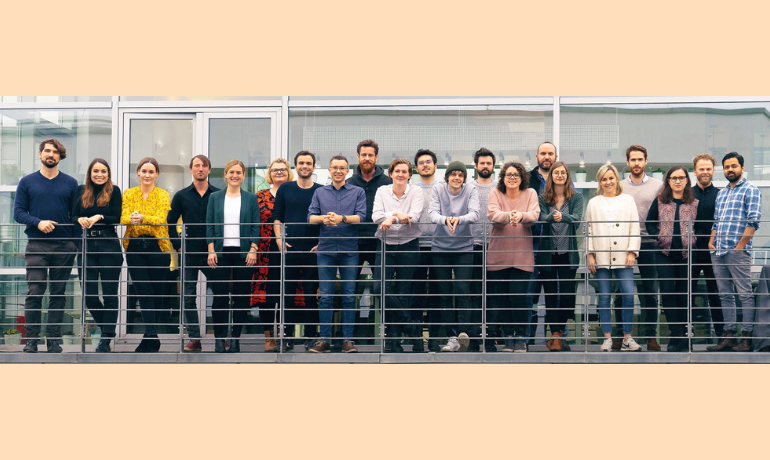A new interview in the EFPA News Magazine informs about the progress of the H-WORK project and provide insights into the role of the different partners of the consortium. EFPA is one of the 14 partners of the H-WORK project. This time, Bruna Zani interviewed Anne Etzelmüller, Team Lead Clinical Research at HelloBetter, registered trademark of GET.ON Institut für Online Gesundheitstrainings GmbH, Hamburg.
1. Can you present us your team and the role of the members in the H-Work Project?
HelloBetter is a leader in the development and implementation of digital therapeutics. Within the H-Work project, the HelloBetter team consists of experienced e-mental health researchers and engineers. Dr. Elena Heber is one of the founders of HelloBetter, VP Content & Research as HelloBetter and an experienced researcher in the field of digital interventions on stress. Prof. Dr. David Ebert holds the professorship of Psychology and Digital Mental Health at the Technical University Munich and is also founder of HelloBetter. Anne Etzelmüller is Team Lead Clinical Research at HelloBetter and is experienced in managing European projects. Lucy Grey-Gardner is a working student on the project, who is involved in the data management processes. Outside of H-Work she is completing a masters degree in Industrial Engineering and Management at the Technical University of Berlin. Gesine Schrade is a working student at HelloBetter. She is supporting the team in responding to data requests. Outside of her work at HelloBetter, she studies mathematics
The team is supported by the Development Team at HelloBetter under the leadership of Amit Gupta, who is Co-founder & VP Engineering at HelloBetter.
2. What is the role of your organization in the H-Work Project?
Within the H-Work project, HelloBetter leads the work package around the data management of the project. HelloBetter is responsible for ensuring the data collected is securely stored and accessible to the research partners. For this purpose, the team built the H-Work database. This also requires the team to be involved in the development of the codebooks and the data collection phases so that we can ensure the questionnaires and variables are uniform across the sites and the data is structured across measurement timepoints. HelloBetter supports the sites in the cleaning of the research data, so that the data the researchers download from the database is ready to be analysed.
Furthermore, HelloBetter is part of the Innovation Management Committee (IMC), with the goal of identifying new concepts, knowledge and methods with regards to digital innovation. HelloBetter is also providing their digital therapy programs for implementation within the H-Work sites.
3. What has your team accomplished in the project so far (results)?
In the first year of the project, HelloBetter built the H-Work database for the quantitative and qualitative data and wrote the data management plan. This plan was then implemented by preparing the data collection tool and data structure. Data has been collected in all sites for the needs-assessment and the baseline data collection. The data collecting is ongoing in parallel with the implementation of intervention at the H-Work sites.
4. What are you currently working on and what are the next steps?
We are continuing to develop our database by adding new data as it is collected from the sites at the different measurement time points. We are consistently contributing to the preparation of questionnaires for the new measurement time points for the different groups. As we go, we provide the data to researchers within the project, so they can analyse the data for their project deliverables and presentations. We host a fortnightly data meeting in which we and the research partners can review the status and quality of data collected.
One of the innovations implemented within the H-Work project is the combination of HelloBetter’s therapy programs with the Sociomapping tool provided by the QED groupl. This combined, multi-level solution is currently implemented in three organisations within the H-Work project. For this implementation, we also translated our therapy program for the treatment of stress caused by the Covid-19 pandemic into Italian language.
5. What are your expectations regarding the outcomes of the project, after 2 years of work?
At HelloBetter, we are aware of the innovative, digital solutions implemented within the H-Work project. Especially in times of the pandemic, digital mental health solutions can provide assistance to the increasing population of stressed employees. Especially with implementing our treatment of stress caused by the Covid-19 pandemic in an Italian hospital setting, we hope to reach many people in need. Also, the combination of HelloBetter and Sociomapping poses a promising innovation, which can be a blueprint for the further implementation of multi-level interventions in companies.
Also, we see all the research data coming in – already, important academic topics are being addressed with the data collected in the project. We know that the H-Work database will be filled with a magnitude of information, ready to be analysed and used for further deployment.
6. There has been a change re the initial expectations?
The data collection has been extended and is organised as flexible as possible while ensuring comparability across sites and measurement timepoints. By re-organising the data collection and management, all sites and research can collect the right data at the right time for their innovations and organisational settings.
7. What are currently the main obstacles for your work in general and in the project?
There is really a lot data collected in the project. 12 sites collecting data at varying time points, specific to their organisations and interventions implemented. We have a good system in place to keep track of all data points and questionnaires and produce a high quality data set, but it is very time and resource intensive.
8. What has been and still is the impact of COVID on the work of your organization for the project?
Of course, the pandemic poses a big change to our original expectations. While we all work together incredibly well and are productive fully online, European projects are still all about international collaboration and being able to see each other is a big part of that. We miss this. Also, the situation has posed some delays on the project and made the implementation of some interventions harder.
9. What is the biggest strength of your organization in advancing the project?
HelloBetter is among the world’s leading providers of digital therapeutics. HelloBetter’s digital prevention and treatment courses cover eight major mental health issues ranging from depression, anxiety or insomnia to vaginismus and chronic pain. More than 30 randomized-controlled studies on the effectiveness and cost-effectiveness of our therapy courses have been published in peer reviewed journals. No other provider globally has a comparable body of clinical evidence for the effectiveness of its solution.
We are providing digital health applications with deep roots in evidence-base and science. All of our therapy courses have been developed and tested within a scientific context by our leading experts in the fields of digital mental health, clinical psychology and health care sciences. By implementing interventions which are evidence-based and thoroughly researched, HelloBetter provides digital mental health interventions that have impact and improve the mental healthcare system as well as the lives of our users.
With this background, we bring the necessary mix of research experience and expertise in digital innovation into the project.
10. How do you think your organization and EFPA can collaborate?
HelloBetter, represented by Prof. Ebert, takes part in the EFPA taskforce on e-heath. This group is involved in activities to monitor and evaluate eHealth applications to guarantee their quality and proper application. HelloBetter wants to educate about digital therapeutics and improve the reach of e-mental health interventions in Europe and beyond. At HelloBetter, we are used to working together with leading psychologists in the field of digital interventions across Europe.
We believe that the collaboration with EFPA can facilitate this goal via dissemination-, implementation-, and education-campaigns and joint research projects.


